新概念英语第二册Lesson31-35课文注释
新概念英语第二册学习手册【Lesson31、33、35】

新概念英语第二册学习手册【Lesson31、33、35】【课文】JEAN: Where's Sally, Jack?JACK: She's in the garden, Jean.JEAN: What's she doing?JACK: She's sitting under the tree.JEAN: Is Tim in the garden, too?JACK: Yes, he is.He's climbing the tree.JEAN: I beg your pardon?Who's climbing the tree?JACK: Tim is.JEAN: What about the dog?JACK: The dog's in the garden, too.It's running across the grass.It's running after a cat.【课文翻译】琼:杰克,萨莉在哪儿?杰克:她在花园里,琼。
琼:她在干什么?杰克:她正在树荫下坐着。
琼:蒂姆也在花园里吗?杰克:是的,他也在花园里。
他正在爬树。
琼:你说什么?谁在爬树?杰克:蒂姆在爬树。
琼:那么狗呢?杰克:狗也在花园里。
它正在草地上跑,在追一只猫。
【生词】garden n. 花园under prep.在……这下tree n. 树climb v. 爬,攀登who pron.谁run v. 跑grass n. 草,草地after prep.在……之后across prep.横过,穿过cat n. 猫【知识点讲解】1. 今天要学习一个重要的语法点:现在实行时态。
在英语中,要表达正在发生的动作或事件,需要用这个时态。
这个时态的基本格式是:be动词现在时+动词的现在实行时态简单一点说就是"am/are/is + 动词ing形式"。
新概念英语第二册课文及翻译31到40
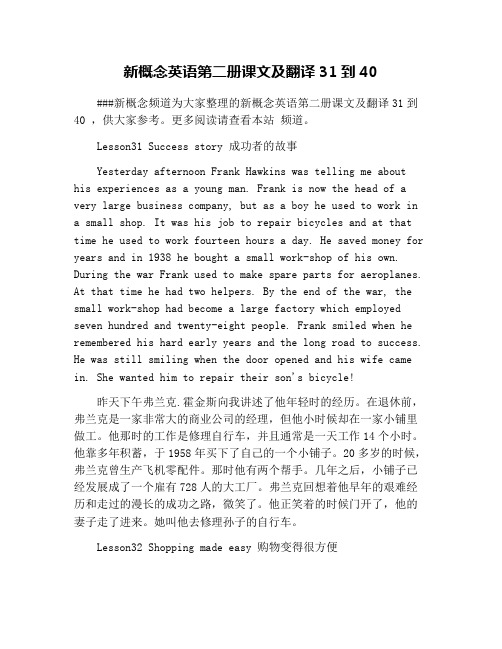
新概念英语第二册课文及翻译31到40###新概念频道为大家整理的新概念英语第二册课文及翻译31到40 ,供大家参考。
更多阅读请查看本站频道。
Lesson31 Success story 成功者的故事Yesterday afternoon Frank Hawkins was telling me about his experiences as a young man. Frank is now the head of a very large business company, but as a boy he used to work in a small shop. It was his job to repair bicycles and at that time he used to work fourteen hours a day. He saved money for years and in 1938 he bought a small work-shop of his own. During the war Frank used to make spare parts for aeroplanes. At that time he had two helpers. By the end of the war, the small work-shop had become a large factory which employed seven hundred and twenty-eight people. Frank smiled when he remembered his hard early years and the long road to success. He was still smiling when the door opened and his wife came in. She wanted him to repair their son's bicycle!昨天下午弗兰克.霍金斯向我讲述了他年轻时的经历。
新概念英语第二册:Lesson35课文注释
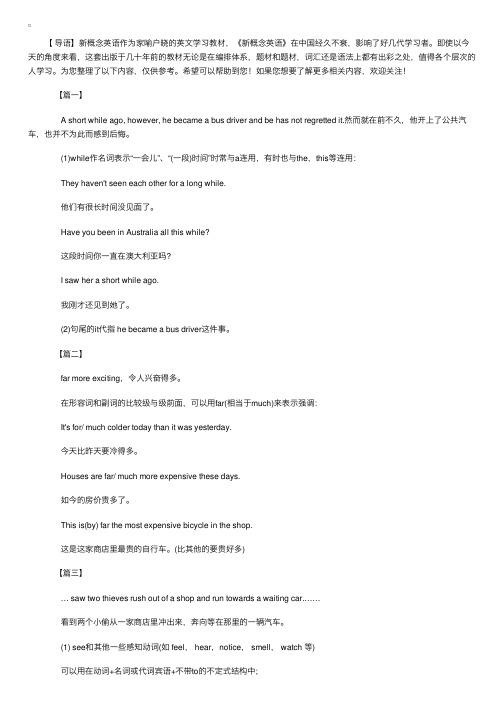
【导语】新概念英语作为家喻户晓的英⽂学习教材,《新概念英语》在中国经久不衰,影响了好⼏代学习者。
即使以今天的⾓度来看,这套出版于⼏⼗年前的教材⽆论是在编排体系,题材和题材,词汇还是语法上都有出彩之处,值得各个层次的⼈学习。
为您整理了以下内容,仅供参考。
希望可以帮助到您!如果您想要了解更多相关内容,欢迎关注!【篇⼀】 A short while ago, however, he became a bus driver and be has not regretted it.然⽽就在前不久,他开上了公共汽车,也并不为此⽽感到后悔。
(1)while作名词表⽰“⼀会⼉”、“(⼀段)时间”时常与a连⽤,有时也与the,this等连⽤: They haven't seen each other for a long while. 他们有很长时间没见⾯了。
Have you been in Australia all this while? 这段时间你⼀直在澳⼤利亚吗? I saw her a short while ago. 我刚才还见到她了。
(2)句尾的it代指 he became a bus driver这件事。
【篇⼆】 far more exciting,令⼈兴奋得多。
在形容词和副词的⽐较级与级前⾯,可以⽤far(相当于much)来表⽰强调: It's for/ much colder today than it was yesterday. 今天⽐昨天要冷得多。
Houses are far/ much more expensive these days. 如今的房价贵多了。
This is(by) far the most expensive bicycle in the shop. 这是这家商店⾥最贵的⾃⾏车。
(⽐其他的要贵好多)【篇三】 … saw two thieves rush out of a shop and run towards a waiting car.…… 看到两个⼩偷从⼀家商店⾥冲出来,奔向等在那⾥的⼀辆汽车。
(完整版)新概念英语第二册lesson31
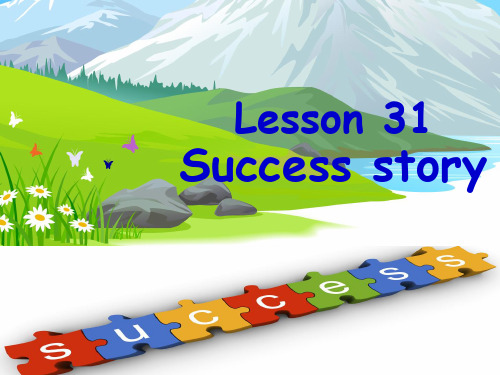
Fill in the blanks 1
♥ ed to的结构
used to“过去常常做某事” 表示过去的习惯动作或某种情况,但是现在 已经停止,不再重复的动作。
I used to go to work by bike, but I go to work by bus now. 区别:be used to do sth.被用来做...
be used to doing sth.习惯于做某事 eg.I used to exercise in the morning.
I am use to exercising in the morning.
It was his job to repair bicycles and at that time he used to work fourteen hours a day.
动♥ 作h的ea持d是续性“。首一领般、过头去目时”则表的示意比思较,短“暂t的h动e 作he或a事d 件。 在of叙+名述故词事”时的,意过思去是进“行时……往的往老用板来表,示头背”景。 ♥ As a boy, as在这里是介词,表示“当…时”, as a boy相当于as he was a boy。
Before he retired, Frank was the head of a very large business company, but as a boy he used to work in a small shop.
新概念英语第二册笔记新版Lesson 31:Success story
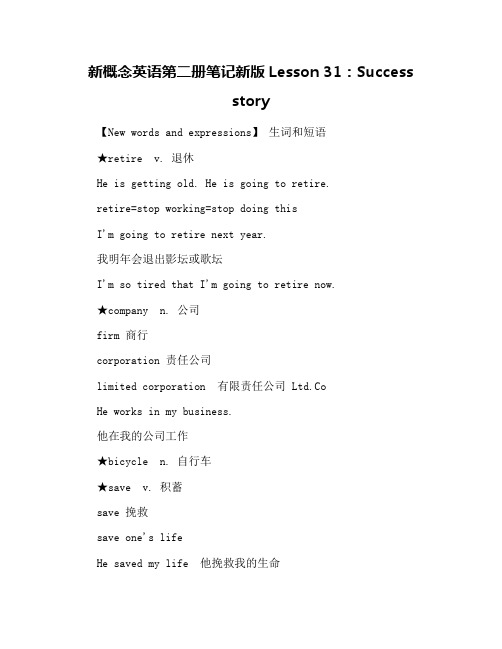
新概念英语第二册笔记新版Lesson 31:Successstory【New words and expressions】生词和短语★retire v. 退休He is getting old. He is going to retire.retire=stop working=stop doing thisI'm going to retire next year.我明年会退出影坛或歌坛I'm so tired that I'm going to retire now.★company n. 公司firm 商行corporation 责任公司limited corporation 有限责任公司 Ltd.CoHe works in my business.他在我的公司工作★bicycle n. 自行车★save v. 积蓄save 挽救save one's lifeHe saved my life 他挽救我的生命save one's face 挽会面子save money 存钱save up 存钱I have saved up for many years.save it for a raining day 未雨绸缪,为将来需要而做好准备★workshop n. 车间workhouse 感化院★helper n. 帮手,助手assistant 助理★employ v. 雇佣employee 雇员employer 雇主trainer 教练trainee 接受训练的人★grandson n. 孙子First listen and then answer the question.听录音,然后回答以下问题。
What was Frank's first job?Yesterday afternoon Frank Hawkins was telling me about his experiences as a young man. Before he retired, Frank was the head of a very large business company, but as a boy he used to work in a small shop. It was his job to repairbicycles and at that time he used to work fourteen hours a day. He saved money for years and in 1958 he bought a small workshop of his own. In his twenties Frank used to make spare parts for aeroplanes. At that time he had two helpers. In a few years the small workshop had become a large factory which employed seven hundred and twenty-eight people. Frank smiled when he remembered his hard early years and the long road to success. He was still smiling when the door opened and his wife came in. She wanted him to repair their grandson's bicycle!参考译文昨天下午弗兰克.霍金斯向我讲述了他年轻时的经历。
新概念英语第二册第35课课文讲解

第35课:是非观(The truth, the whole truth and nothing but the truth)主题:本课主要讲述了关于是非观的话题,通过对话形式展现了不同人对待是非问题的态度,引发了读者对于诚实和诚信的思考。
内容:1. 对话一:两位朋友在谈论是否应该坦诚对待他人,一方认为应该坦诚相待,不应隐瞒事实;另一方则认为在某些情况下,应该适当地隐瞒真相,以避免伤害他人。
2. 对话二:一位小姑娘提到在上学时老师问她父亲的职业,她因为父亲是个生活困难的地产商,所以编造了一个谎言。
在得知真相后,她的母亲批评她应该诚实面对并勇敢地承担。
3. 对话三:一位男士在描述一个与朋友的交谈,他的朋友认为在某些情境下,可以隐瞒或改变事实,从而取得更好的结果。
男士则认为应该坚持诚实,不宜随意改变事实。
结构:一、引入:初步描述本课讨论的内容和主题,引发读者的兴趣。
二、对话一:分析对话中两位朋友的立场和理由,探讨他们对于诚实和隐瞒的不同看法。
三、对话二:分析小姑娘的谎言行为以及母亲对其的批评,展示了诚实与谎言之间的对立。
四、对话三:展示了另一位男士对于隐瞒事实的立场,并展开分析对话中的观点。
五、总结:对于诚实和诚信的重要性进行总结和反思,结合对话内容给出自己的看法。
结语:以总结和展望未来的方式结束文章,给读者留下深刻的印象。
本课讲述了一个深入浅出的话题,针对真实和虚假的界限进行了深入的探讨。
读者不仅可以从中感受到主人公在面对不同情境时,以及对于诚实和诚信的态度,还能引发自己对于这一话题的思考。
希望读者在深入阅读本文后,能够对诚实和诚信有更深入的认识,也能够在日常生活中注重真实、诚实地对待他人。
诚实和诚信是人类社会相处的基石,是人与人之间建立信任和友谊的重要因素。
然而,在现实生活中,我们常常会面对种种情境和压力,导致我们产生隐瞒、扭曲甚至编造事实的行为。
对于是非观的探讨,不仅仅是对待他人的态度,更是对自己人品和道德的检验。
新概念第二册Lesson 31 Success story讲义
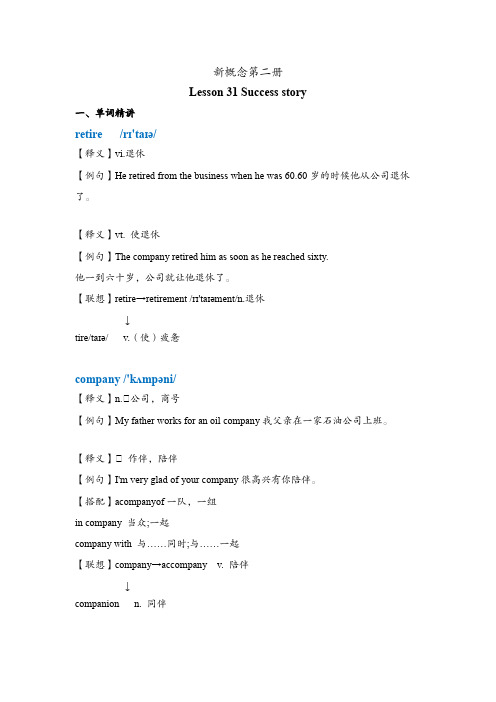
新概念第二册Lesson 31 Success story一、单词精讲retire /rɪ'taɪə/【释义】vi.退休【例句】He retired from the business when he was 60.60岁的时候他从公司退休了。
【释义】vt. 使退休【例句】The company retired him as soon as he reached sixty.他一到六十岁,公司就让他退休了。
【联想】retire→retirement /rɪ'taɪəment/n.退休↓tire/taɪə/ v.(使)疲惫company /'kʌmpəni/【释义】n.①公司,商号【例句】My father works for an oil company我父亲在一家石油公司上班。
【释义】① 作伴,陪伴【例句】I'm very glad of your company很高兴有你陪伴。
【搭配】acompanyof一队,一组in company 当众;一起company with 与……同时;与……一起【联想】company→accompany v. 陪伴↓companion n. 同伴bicycle /'baɪsɪkəl/【释义】n.自行车【例句】They usually go to school bybicycle.他们通常骑自行车上学。
【联想】bicycle→motorcycle n.摩托车↓recycle v.回收利用save /seɪv/【释义】vt.&vi.①积蓄,储蓄,攒钱【例句】I saved part ofmy salary each month.我每月把工资存起来一部分。
【释义】① 救,挽救【例句】He saved the boy from the fire.他从火中救出了那个男孩。
【释义】① 节省,节约【例句】We’ll take a taxi to save time.我们坐出租车,好节省时间。
2020最新新概念英语第二册课文注释Lesson31~33

新概念英语第二册课文注释Lesson311.Before he retired, Frank was the head of a very large business company, but as a boy he used to work in a small shop. 在退休前,弗兰克是一家非常大的商业公司的经理,但他小时侯却在一家小铺里做工。
(1)head在此处的意思不是人或动物的“头部”,而是“首领”、“头目”,一般出现在“the head of +名词”结构中:John is the head of the family.约翰是一家之主。
Frank is the head of that firm.弗兰克是那家公司的总裁。
(2) as在这里为介词,表不“当……时”,as a boy相当于 as he was a boy。
2.It was his job to repair bicycles…他那时的工作是修理自行车……it为“先行主语”,句子的真正主语为to repair bicycles。
3.He saved money for years and in 1958 he bought a small workshop of his own. 他靠多年积蓄,于1958年买下了自己的一个小铺子。
(1)for years表示“许多年”。
(2)of one's own为固定短语,表示“自己的”、“属于自己的”,own为代词:He wanted a room of his own.他想要一个自己的房间。
Do you have a house of your own?你有自己的房子吗?4.in one's twenties,(在某人)二十多岁的时候。
one's twenties/thirties/forties…,二十多岁/三十多岁/四十多岁……10的倍数的复数形式可用于表达近似的、非确定的数量,与所有格形容词(my等)连用时表示大约的年龄:My aunt Jennifer is in her late thirties/early forties, but she often appears on the stage as a young girl.我的姑妈詹妮弗已接近四十岁/四十出头,但她却常在舞台上扮演小姑娘。
- 1、下载文档前请自行甄别文档内容的完整性,平台不提供额外的编辑、内容补充、找答案等附加服务。
- 2、"仅部分预览"的文档,不可在线预览部分如存在完整性等问题,可反馈申请退款(可完整预览的文档不适用该条件!)。
- 3、如文档侵犯您的权益,请联系客服反馈,我们会尽快为您处理(人工客服工作时间:9:00-18:30)。
新概念英语第二册Lesson31~35课文注释为了方便同学们的学习,下面我就和大家共享新概念英语第二册Lesson31~35课文解释,盼望有了这些内容的关心,可以为大家学习新概念英语提供关心!新概念英语第二册课文解释Lesson311.Before he retired, Frank was the head of a very large business company, but as a boy he used to work in a small shop. 在退休前,弗兰克是一家特别大的商业公司的经理,但他小时侯却在一家小铺里做工。
(1)head在此处的意思不是人或动物的“头部”,而是“首领”、“头目”,一般出如今“the head of +名词”结构中:John is the head of the family.约翰是一家之主。
Frank is the head of that firm.弗兰克是那家公司的总裁。
(2) as在这里为介词,表不“当……时”,as a boy相当于 as he was a boy。
2.It was his job to repair bicycles…他那时的工作是修理自行车……it为“先行主语”,句子的真正主语为to repair bicycles。
3.He saved money for years and in 1958 he bought a small workshop of his own. 他靠多年积蓄,于1958年买下了自己的一个小铺子。
(1)for years表示“很多年”。
(2)of ones own为固定短语,表示“自己的”、“属于自己的”,own为代词:He wanted a room of his own.他想要一个自己的房间。
Do you have a house of your own?你有自己的房子吗?4.in ones twenties,(在某人)二十多岁的时候。
ones twenties/thirties/forties…,二十多岁/三十多岁/四十多岁……10的倍数的复数形式可用于表达近似的、非确定的数量,与全部格形容词(my等)连用时表示大约的年龄:My aunt Jennifer is in her late thirties/early forties, but she often appears on the stage as a young girl.我的姑妈詹妮弗已接近四十岁/四十出头,但她却常在舞台上扮演小姑娘。
5.Frank smiled when he remembered his hard early years and the long road to success. 弗兰克回想着他早年的困难经受和走过的漫长的胜利之路,微笑了。
(1)hard意思许多,在这里指“困难的”、“困苦的”: She lived a hard life in those years.那些年她的生活很困难。
(2)ones early years指某人的早年(生活),意义相近的表达方式为early in ones life。
(3) the long road to success是一种比方的说法,因为success 是抽象名词。
to在这里表示方向、目的地,意义为“朝”、“往”、“向”等,这个短语的字面意义为“通向胜利的漫漫长路”。
新概念英语第二册课文解释Lesson321.People are not so honest as they once were. 人们不再像以前那样老实了。
(1)“not so + 形容词+ as”引导的是比较状语从句,表示较低的程度,通常译为“不如……那样……”。
(cf.本课语法)(2)once表示“以前”、“曾经”时只能与动词的过去式连用: He once worked at a large company.他曾经在一家大公司工作过。
2.The temptation to steal is greater than ever before…偷窃的诱惑力比以往任何时候都更剧烈……(1)不定式 to steal为 temptation的定语,说明是什么样的诱惑。
to引导不定式和to作为介词的区分很大:The temptation to smoke is strong for him.对他来说吸烟有很强的诱惑力。
(to smoke为不定式)The cake on the table is a great temptation to the child.桌上的蛋糕对那孩子是个极大的诱惑。
(to the child为介词短语) (2)ever用于表示比较的从句中时意义为“曾经”、“以往任何时候”。
在这句话中,省略的成分比较多,与ever before相比的是隐含的时间now,从句中省略成分为 it was(在 ever之前)。
大多数含有比较状语从句的句子都可以省略句中的成分。
3.on Monday mornings,在星期一上午。
morning用复数形式是表示常常性的状况,它前面有修饰词Monday,所以介词要用on。
4.One Monday, there were fewer people in the shop than usual when the woman came in, so it was easier for the detective to watch her. 有一个星期一,当这位妇女走进这家商场时,里面的人比平常少,因此,侦探比较简单监视她。
(1)one在此处表示“某一个”,不能用a 代替。
(2)这个句子较长,there were引导的是主句,when引导的是它的时间状语从句,so引导的是结果状语从句,在主句和结果状语从句中又分别隐含比较状语从句。
在结果状语从句中,it为先行词,真正的主语是不定式短语for the detective to watch her。
不定式短语往往较长,作主语时通常要用先行词it作为形式主语:It is easy for you to help me.你关心我是很简单的。
5.as quickly as possible,以最快的速度。
as…as possible为固定短语,表示“尽可能”:He went home as soon as possible.他尽快回了家。
I have sent you as many books as possible.我已经把书尽可能多地给你送来了。
6.Then the woman simply took the parcel and walked out of the shop without paying. 然后,那妇女拿过包就走出了商场,根本没有付钱。
simply表示“仅仅”、“只”,有加强语气的作用。
连词and表示动作的连续,相当于 and then。
withoug paying可以当成是整个句子的方式状语,即那妇女没有,……就……paying为动名词。
7.The girl‘gave’her mother a free dress once a week! 那姑娘每星期“送”她母亲一件免费的衣服! (1) gave加引号,表示姑娘不是真正给,而是偷。
(2) free在这里的含义为“免费的”、“不要钱的”:Children under five years old travel free.5岁以下儿童免费旅行。
Tom gave me two free tickets.汤姆给了我两张免费的票。
(3)“once a+ 表示时间的名词”可以表示频率:He comes to the office once a day.他每天来办公室一次。
Frank writes to his mother once a month.弗兰克每个月给他母亲写一次信。
新概念英语第二册课文解释Lesson331.Nearly a week passed before the girl was able to explain what had happened to her. 几乎过了一个星期,那姑娘才能讲解并描述自己的遭受。
(1) 这句话有两个从句。
before始终到结尾是句子的时间状语从句。
在这个从句中,explain又有自己的宾语从句,what为这个从句的主语。
(2) before在引导时间状语从句时,有时不肯定译为“在……之前”,虽然表达的是这个意思,如文中的这句话。
类似的状况有:It will be months before he can come back.要过好几个月他才能回来。
He ran off before his mother could stop him.他母亲还没来得及阻挡他,他就跑掉了。
2.One afternoon she set out from the coast in a small boat and was caught in a storm. 一天下午,她乘小船从海岸出发,遇上了风暴。
(1) 我们已经学过 set out表示“出发”: Captain Alison will set out at eight oclock.艾利森船长将于8点钟启航。
set out from表示“从……出发”。
(2) be caught in表示某人“(突然)遇到/上(风暴等)”:He was caught in a heavy rain on the way home.他在回家途中遇到了大雨。
3.Then she swam to the shore after spending the whole night in the water. 她在海里游了整整一夜才游到岸边。
介词after的宾语是动名词spending及这个动名词的宾语、状语,这个结构在意义上等于 after she had spent the whole nightin the water。
4.During that time she covered a distance of eight miles. 在那段时间里,她游了8英里。
(1)that time指上句话中提到的the whole night。
(2)cover可以笼统地表示“行过(一段路程)”,依据上下文可具体译为“走过”、“飞过”、“游过”等:The bird covered the distance in three minutes.这只鸟用3分钟飞完了全程。
(3)表示具体的距离可以用“a distance of+ 具体长度”这个结构。
